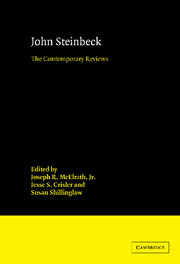Book contents
- Frontmatter
- Contents
- Series Editor's Preface
- Introduction
- 1 Cup of Gold (1929)
- 2 The Pastures of Heaven (1932)
- 3 To a God Unknown (1933)
- 4 Tortilla Flat (1935)
- 5 In Dubious Battle (1936)
- 6 Of Mice and Men (the novel, 1937)
- 7 The Red Pony (1937)
- 8 Of Mice and Men (the play, 1937)
- 9 The Long Valley (1938)
- 10 The Grapes of Wrath (1939)
- 11 The Forgotten Village (1941)
- 12 Sea of Cortez (1941)
- 13 The Moon Is Down (the novel, 1942)
- 14 The Moon Is Down (the play, 1942)
- 15 Bombs Away (1942)
- 16 Cannery Row (1945)
- 17 The Wayward Bus (1947)
- 18 The Pearl (1947)
- 19 A Russian Journal (1948)
- 20 Burning Bright (the novel, 1950)
- 21 Burning Bright (the play, 1950)
- 22 The Log from the Sea of Cortez (1951)
- 23 East of Eden (1952)
- 24 Sweet Thursday (1954)
- 25 The Short Reign of Pippin IV (1957)
- 26 Once There Was a War (1958)
- 27 The Winter of Our Discontent (1961)
- 28 Travels with Charley in Search of America (1962)
- 29 America and Americans (1966)
- 30 Journal of a Novel: The East of Eden Letters (1969)
- 31 The Acts of King Arthur and His Noble Knights (1976)
- 32 Working Days: The Journals of The Grapes of Wrath 1938–1941 (1989)
- Index
28 - Travels with Charley in Search of America (1962)
Published online by Cambridge University Press: 03 May 2010
- Frontmatter
- Contents
- Series Editor's Preface
- Introduction
- 1 Cup of Gold (1929)
- 2 The Pastures of Heaven (1932)
- 3 To a God Unknown (1933)
- 4 Tortilla Flat (1935)
- 5 In Dubious Battle (1936)
- 6 Of Mice and Men (the novel, 1937)
- 7 The Red Pony (1937)
- 8 Of Mice and Men (the play, 1937)
- 9 The Long Valley (1938)
- 10 The Grapes of Wrath (1939)
- 11 The Forgotten Village (1941)
- 12 Sea of Cortez (1941)
- 13 The Moon Is Down (the novel, 1942)
- 14 The Moon Is Down (the play, 1942)
- 15 Bombs Away (1942)
- 16 Cannery Row (1945)
- 17 The Wayward Bus (1947)
- 18 The Pearl (1947)
- 19 A Russian Journal (1948)
- 20 Burning Bright (the novel, 1950)
- 21 Burning Bright (the play, 1950)
- 22 The Log from the Sea of Cortez (1951)
- 23 East of Eden (1952)
- 24 Sweet Thursday (1954)
- 25 The Short Reign of Pippin IV (1957)
- 26 Once There Was a War (1958)
- 27 The Winter of Our Discontent (1961)
- 28 Travels with Charley in Search of America (1962)
- 29 America and Americans (1966)
- 30 Journal of a Novel: The East of Eden Letters (1969)
- 31 The Acts of King Arthur and His Noble Knights (1976)
- 32 Working Days: The Journals of The Grapes of Wrath 1938–1941 (1989)
- Index
Summary
Eric Moon.
“Travels with Charley.”
Library Journal, 87
(15 June 1962), 2378.
Charley is “an old French gentleman poodle” with a placid temperament and cultural pretensions. John Steinbeck is an aging writer with a romantic view of himself as a “man of the people,” now worried that the America he has been writing about for 20 years has passed him by. This is the crew of Rocinante, a three-quarter-ton pickup truck equipped with a miniature ship's cabin and named after Don Quixote's horse. Their journey of rediscovery takes them through 40 states, but it is really no more than an excuse for Steinbeck to be along, to meet again people on the road, and to muse nostalgically about the way things used to be before “progress” came along. The mood ranges from sentiment (his love affair with Montana), through gentle irony (Texas hospitality), to a rather naive horror over the mechanical demonstrations by strident women outside New Orleans schools. The prose is, as one would expect, always competent, often self-conscious, sometimes superb. It's a slight, inconsequential book by a nice man rather than a great novelist. But it's a pleasant evening's reading, and it will be deservedly popular.
Orville Prescott.
“Books of the Times.”
New York Times,
27 July 1962, p. 23.
Soon after Labor Day in the autumn of 1960 a big man with a beard and a large dog with a scraggly mustache set forth together on an automobile tour of the United States. The man was John Steinbeck, one of the most successful of contemporary American novelists.
- Type
- Chapter
- Information
- John SteinbeckThe Contemporary Reviews, pp. 479 - 496Publisher: Cambridge University PressPrint publication year: 1996
- 1
- Cited by



